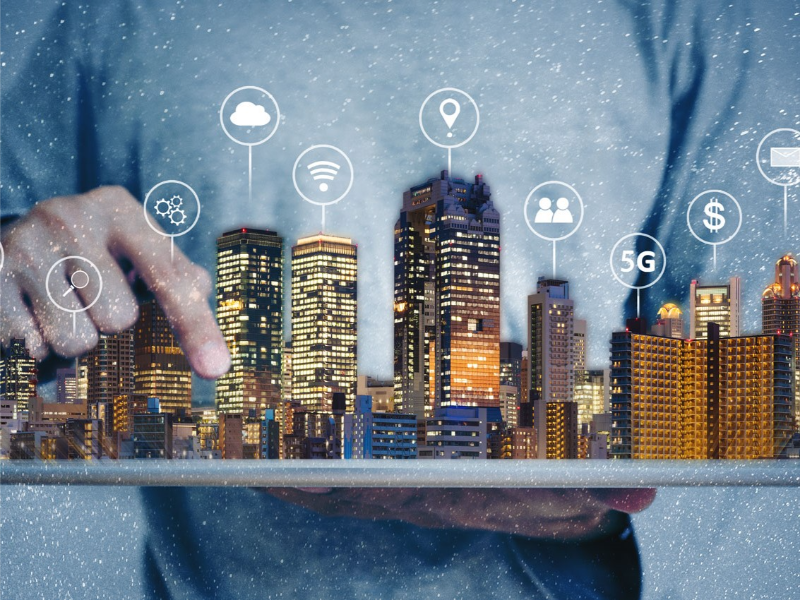- Smart city solutions are comprehensive technology applications that aim to enhance the efficiency of city management and service levels.
- As cities continue to evolve, it is essential that the development of smart city solutions remains people-centric, focusing on the needs and well-being of all residents.
Smart city solutions are comprehensive technology applications that aim to enhance the efficiency of city management and service levels through a new generation of information technology (e.g. cloud computing, Internet of Things, big data and artificial intelligence) to achieve sustainable development. These solutions cover a wide range of aspects, including smart parks, smart water, smart transport, smart communities, smart city management and so on.
Core technology
Specifically, smart city solutions are usually based on the following core technologies:
- Internet of things (IoT): Collects large amounts of real-time data through sensors and monitoring devices to achieve efficient management and optimisation of various city resources.
- Cloud computing: Provides powerful data storage and processing capabilities to support information resource sharing and business collaboration among various systems in the city.
- Big data: Mining and analysing massive data by using data analysis technology to provide scientific basis for urban decision-making.
- Artificial intelligence (AI): Improve the intelligence level of city management, such as intelligent traffic management and intelligent security, through technologies such as machine learning and deep learning.
- 5G technology: Provides a high-speed, low-latency communication network to support access to more intelligent devices and more complex real-time data transmission.
Also read: Unravelling the role of an IoT solutions architect
Smart city solutions
Specifically, smart city solutions include the following:
- Infrastructure construction: Through the unified spatial and temporal benchmark of big data, cloud computing, Internet of Things, intelligent video, and 5G technology, to build a shared and integrated information and data resource centre, and to achieve planning, layout, analysis and decision-making based on a unified spatial and temporal foundation.
- People’s livelihood services: Provide efficient services in intelligent transport systems, remote medical care, intelligent parking, police alerts, etc. using AI technologies, thus enhancing the quality of life of citizens.
- Urban governance: Optimise energy management and public safety through real-time monitoring and remote control of municipal assets to achieve refined urban management.
- Industrial economy: Promote the application of smart parks, smart water, smart transport, smart communities and other fields, providing quality development space for urban enterprises.
- Ecological livability: Optimise the ecological environment of the city through digital twin technology and environmental energy consumption monitoring, providing a more convenient, efficient and livable urban life.
- Case practice: For example, China Telecom’s “5G City” project in Xiamen, Fujian Province, China Mobile’s OneCity smart city platform in Quannan County, Ganzhou City, Jiangxi Province, and China Unicom’s CityNEXT, the city’s smart brain, in the Shougang Science and Technology Park of the Winter Olympics in Beijing are all typical smart city solutions.
These solutions not only help cities to solve all kinds of “urban diseases”, but also promote the sustainable development of cities, improve the quality of life of citizens and the overall competitiveness of cities.
Also read: LG’s strategic Athom buyout boosts smart home AI
Application scenarios and services
In addition, smart city solutions include a variety of application scenarios and services, such as:
- Smart traffic: Optimises traffic flow management and reduces congestion through real-time traffic data analysis and intelligent scheduling systems.
- Smart water: Real-time monitoring and intelligent scheduling of water resources using sensors and data analysis technology.
- Intelligent community: Build a digital community platform to provide convenient public services and resident interaction.
- Intelligent city management: through video surveillance and data analysis, improve the efficiency of urban security and environmental management.
These solutions not only improve the operational efficiency of cities and the quality of public services, but also enhance residents’ sense of well-being and satisfaction and promote sustainable urban development.
The future of smart city solutions is bright, with ongoing advancements in technology and a growing understanding of their potential to improve urban living. As cities continue to evolve, it is essential that the development of smart city solutions remains people-centric, focusing on the needs and well-being of all residents.

